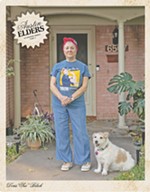APD’s Sex Crimes Unit Is Undergoing a Major Overhaul. Here’s What Year One Brought.
The project is led by a plaintiff in suit against APD
By Maya Wright, Fri., Jan. 5, 2024

The Austin Police Department still has a long way to go in overhauling its Sex Crimes Unit. Only three years ago, APD was in the midst of litigation over mishandling evidence in a number of sexual assault cases and, on many occasions, closing rape cases without making arrests. As a result of those lawsuits, APD agreed to transform the unit. Now, the department has completed their first year working on the multimillion-dollar project that they say will deliver systemic change and set a new standard for best practices.
The goal of the Collective Sex Crimes Response Model Project is to implement 119 changes to the unit, most of which were identified after a multiyear audit led by the Police Executive Research Forum. City Council requested PERF to investigate in a 2019 resolution, noting the department's high rate of "exceptional clearance" of rape cases. Once published, survivors found the report validating, though they cautioned that "actions speak louder than words," as plaintiff Kristen Troken told the Chronicle in 2022.
The report included 103 recommendations for the department, some of them fairly abstract (one states, for example, that "detectives should approach each sexual assault case with an open mind"). Implementing all 103 recommendations was part of the terms agreed to in a lawsuit settlement, though the settlement added on another 16 tasks. Some of the 16 are pretty concrete: 15.15 and 15.16 state that the department make "personal apologies to plaintiffs" and a "public apology to all [sex] assault victims." As of this fall*, both goals were highlighted as "in progress.”
Hanna Senko – a lead plaintiff in the 2020* case against the city – was on the team of attorneys and plaintiffs instrumental in constructing the victim settlement terms and criticized the department for not acknowledging many of the sexual assault survivors' concerns sooner. Senko was raped in 2006, and detectives did not investigate the crime scene or interview witnesses. In 2021, Senko spoke with the Chronicle about then-incoming APD Chief Joseph Chacon and was concerned about the priorities of the administration at the time, saying, "I am done giving credit or believing that change will happen until I see it."
Now, Senko works for APD, leading the overhaul effort under contract as project manager for the Collective Sex Crimes Response Model. As project manager, Senko oversees the progress of each division within the model and told us she views her role as "a 'bridge' between many of the stakeholders and project team members representing agencies in this space." When asked how it feels to be involved with the project given her personal experience with APD, Senko told the Chronicle, "I am simply and deeply proud to see how far we have come. I honestly didn't think I'd ever see us get to this point in Austin. I am proud of myself for riding the ups and the downs of it all over the past six years."
City Council Member Alison Alter, who has been vocal about APD accountability, said survivors' input is key for the future. That includes Senko's leadership role, as well as providing public forums to foster a culture of continued improvement. "I'm really hopeful that we will go from having been very problematic in how we approach this to being the model in the country."
After formally starting the project at the beginning of 2023, the project team announced this fall* that they had accomplished five items out of the total 119 recommendations. Nearly half of all recommendations were labeled as "in progress" by the end of the year. The framework of the CSCRM is organized into six work groups, in which each group is led by two chairs (one APD individual and one non-APD individual). As for why APD believes their model will be unprecedented in its approach, project team members say they are extremely focused on engagement with community advocates and, as Alter said, "having the right people in the right seats."
Nearly half of the seats on the CSCRM Project Team are "community advocates and partners." These members are responsible for tackling many of the recommendations assigned to the Outreach & Partnerships work group. Two tasks assigned to this work group were completed in 2023 and 10 were in progress. Five were not started in 2023.* But their main focus has been on creating a strong foundation for long lasting policy implementation, said SAFE Alliance's Holly Bowles. SAFE, a nonprofit supporting survivors of sexual assault and abuse, has been involved in the model since the PERF report was released, with Bowles and Director of Forensic Nursing Jenny Black both co-chairing a work group. "It's going to take longer than we might like for the project to be done because of how thorough we're being," Bowles said. "I think the most important goal of the project is restoring community trust and ensuring collaboration."
*Editor' Note Friday, January 5, 1:51pm: This story has been updated. A previous version of the story incorrectly stated task completion numbers were up to date as of December; the story sources numbers from the most recent presentation on task completion given in November, but the report covered only the first three quarters of 2023. It also incorrectly stated Hanna Senko was a lead plaintiff in a 2018 lawsuit; she was the lead plaintiff in a 2020 lawsuit. The Chronicle regrets errors.
Got something to say on the subject? Send a letter to the editor.








